Let's tackle our hair struggles together.
Hair Fall Queries?
Join our community to get answers to all your hair queries by certified hair coaches.
JOIN THE GROUPPlease download Telegram to become part of our community
Your cart(0)
Your cart is currently empty.
Your cart(0)

Air, water and the kind of food we eat, all of it impacts hair.
High stress levels can disrupt the hair cycle, leading to excess hair fall
Natural body imbalances can lead to thinning and increased hair fall
When your body isn’t functioning at its best, hair can become dry, weak, and prone to breakage
A diet lacking essential nutrients can slow down hair growth
TRAYA’S HOLISTIC PLAN FOR HAIR FALL
Our approach combines the goodness of three sciences. With ingredients from the most authentic sources, we personalize your solutions delivering assured results.
Take The Hair TestJoin us to break the hair loss myths and get the right information out.

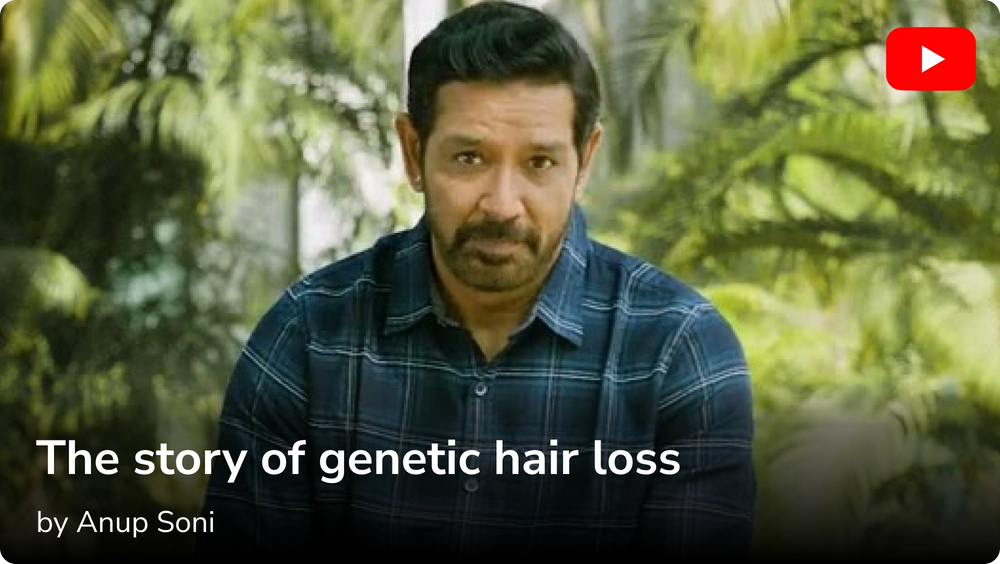
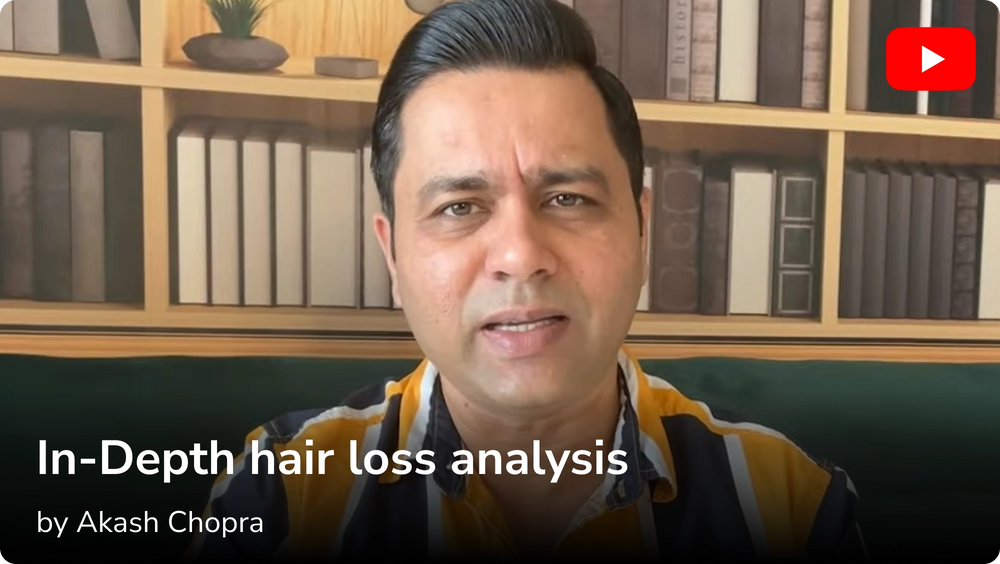
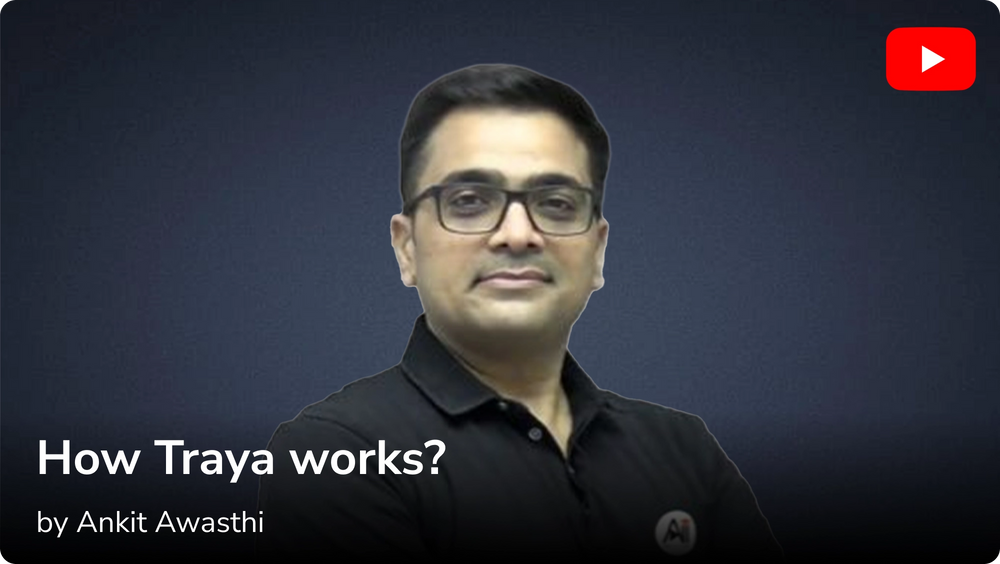
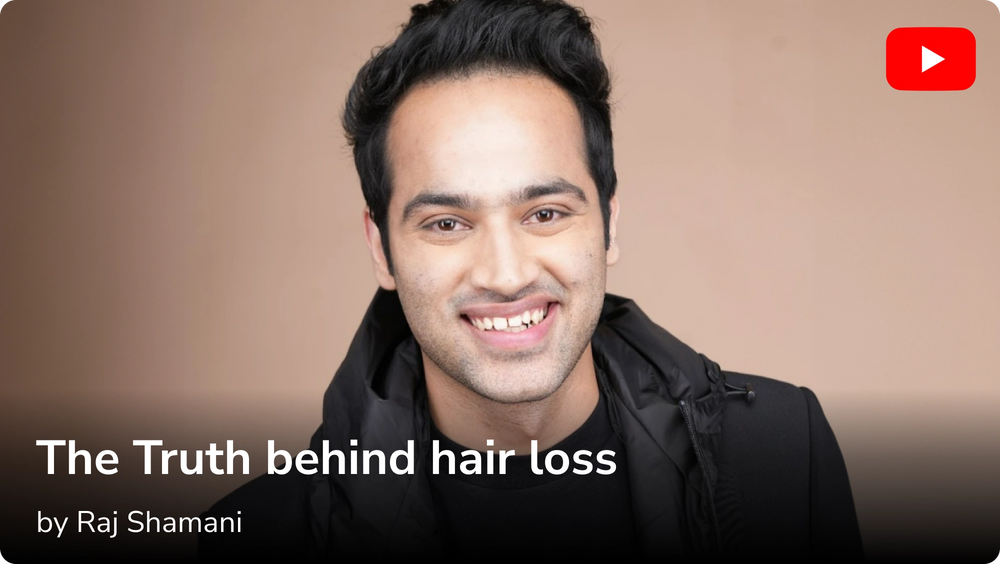
Let's tackle our hair struggles together.
Please download Telegram to become part of our community

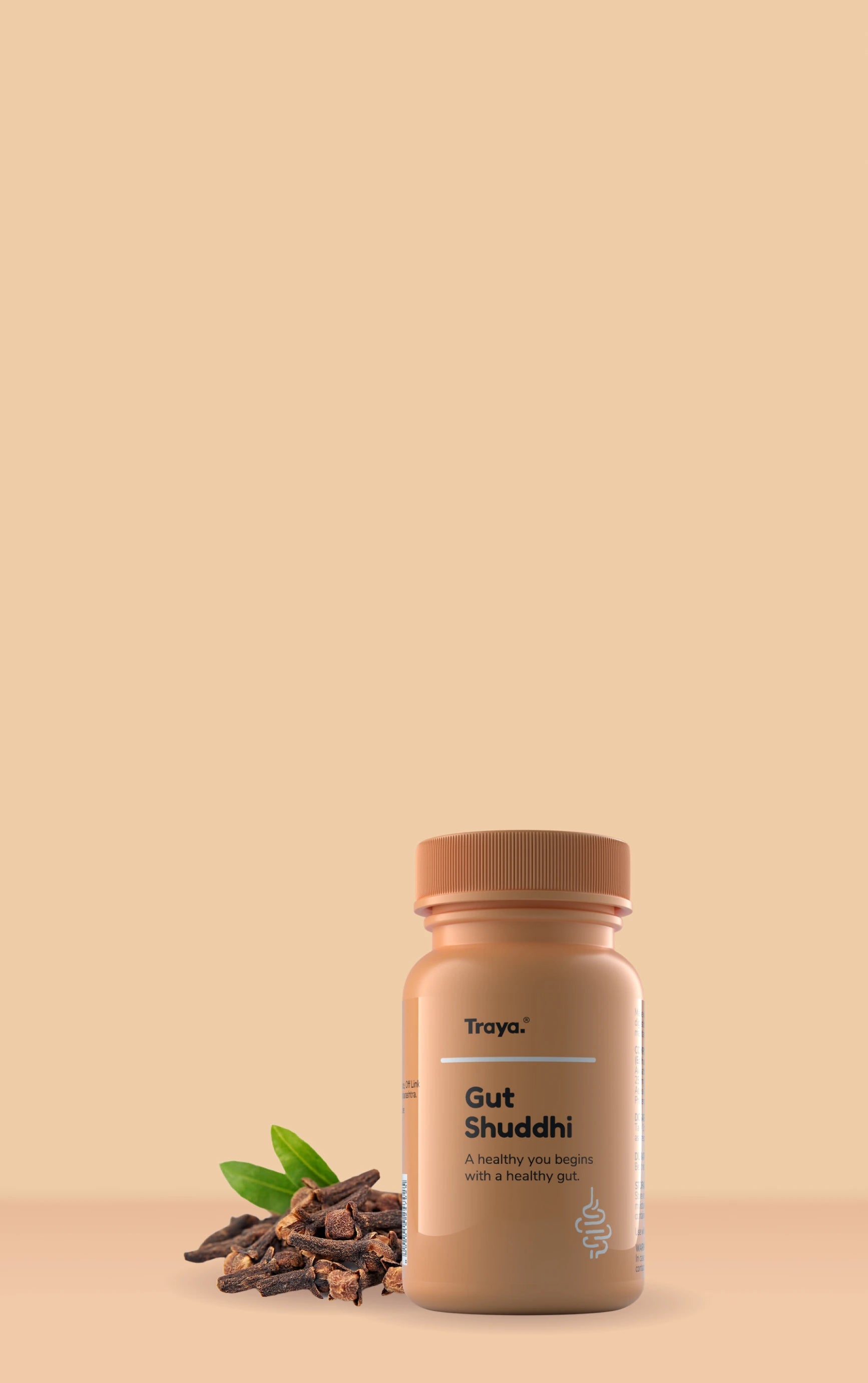
TRAYA 2X2 REGIMEN
Google Reviews
You wake up, run your fingers through your hair, and there it is a small bunch of strands left behind on the pillow.
A little concerning, but you brush it off. Maybe you changed your shampoo recently. Or maybe it’s the hard water.
But then it keeps happening.
In the shower. While tying your hair. After a long day at work.
You’re not scratching. You’re not itching. But the hair keeps thinning.
And slowly, the question changes from “What product should I use?” to “Why is this happening to me?”
For many people, especially those in their 20s and 30s, the answer isn't something you can see in the mirror.
It’s stress the kind that builds quietly, and shows up where you least expect it.
You're not alone. Over the years, several well-known names have opened up about unexpected hair loss:
Jada Pinkett Smith spoke publicly about her journey with hair fall, even sharing how emotionally difficult it was.
Selena Gomez revealed hair thinning after lupus treatment, but also noted how anxiety worsened her scalp condition.
Ayushmann Khurrana, in an old interview, talked about struggling with visible hair fall during back-to-back shoots.
Karan Johar once joked about wearing hats more often during events only to later confirm he had dealt with severe hair thinning.
These aren't isolated stories. They just happen to be ones we’ve seen on camera.
The rest of us experience the same anxiety, just off the record.
When you're under chronic stress even if it's “I’ll just power through” kind of stress your body produces more cortisol.
Cortisol is your survival hormone. It's useful in short bursts. But over time, it disrupts key systems like sleep, digestion, immunity, and yes your hair growth cycle.
Hair doesn’t fall overnight. Instead, it quietly enters a resting phase. The strands sit idle for weeks. And around 6–8 weeks later, they start falling all at once.
This delayed reaction is why most people never connect the shedding to the stress.
By the time you notice something's off that your hair feels thinner, or your scalp is more visible the damage has already begun.
Stress-induced hair fall is almost always reversible.
It doesn’t need extreme medication.
It just needs to be identified correctly and early.
In this guide, we’ll show you:
How to recognise if your hair loss is actually linked to stress
What makes it different from hormonal, nutritional, or scalp-related hair fall
What you can start doing today and what to avoid
And how the Traya Hair Test helps you decode the real reason your hair is falling using a combination of medical science, lifestyle mapping, and expert diagnosis
Because stress doesn’t always shout.
Sometimes, it whispers through your hairbrush.
Let’s understand how to listen and what to do next.
Let’s simplify this. Your hair grows in cycles and it’s not growing all the time.
At any given moment:
Around 90% of your hair is actively growing (this is called the Anagen phase)
About 10% is in a resting phase (this is the Telogen phase)
Now here’s where stress walks in.
When your body is under chronic or intense stress even if it's not visible stress like panic attacks it can trigger a response called Telogen Effluvium.
What does that mean?
Imagine your hair strands are employees working in a company.
Most of them are working hard (growing)
A few are on leave (resting)
Suddenly, the company (your body) goes into crisis mode: budget cuts, panic, overwork
So what does it do? It sends more employees on leave at the same time, even the ones who were performing well
This is what stress does to your scalp.
It pushes more hair follicles into the resting phase prematurely.
And once they’ve been “resting” for a few weeks, they start shedding.
That’s when you see hair fall on your pillow, in the shower, or in your comb.
But the stress that caused it? That happened 6–8 weeks ago.
It could be:
Emotional (breakup, grief, burnout, anxiety)
Physical (post-surgery, illness, weight loss)
Environmental (exam pressure, poor sleep, overtraining, back-to-back night shifts)
Even “good stress” can trigger it like wedding planning or moving cities.
It increases cortisol levels (stress hormone), which reduces the flow of nutrients to your hair follicles
It affects your gut health, which in turn affects nutrient absorption (especially iron and B-vitamins)
It creates micro-inflammation on the scalp, making roots weaker
It disrupts your sleep cycle, which is when hair repair and regrowth actually happen
And in some people, it even causes tightening of scalp muscles, reducing blood flow to follicles
So it’s not just in your head. Stress literally creates a biological environment where your hair finds it harder to grow, and easier to fall.
Stress doesn’t always look like stress. And stress-related hair fall doesn’t always feel different from regular hair fall.
But there are patterns and if you pay attention, your body gives you clues.
Here are the most common signs that your hair fall is being triggered by stress:
This is the most confusing part. You go through something intense say, a rough 2 months at work, or a personal setback.
But your hair seems fine.
Then 6–8 weeks later, it starts falling rapidly.
That delay is typical of Telogen Effluvium, the stress-triggered hair shedding condition. It’s one of the easiest signs to miss but also one of the most important to catch.
In stress-related hair fall:
The shedding is diffuse meaning it's happening from the entire scalp, not just one area like the crown or hairline
You may notice more hair on the pillow, in the drain, on the comb sometimes 150–300 strands a day
And yet, you might not see bald patches. It just feels like volume loss or a thinner ponytail.
If you:
Don’t have dandruff
Don’t have itching, flaking, or scalp buildup
Don’t see any redness or inflammation
…but you’re still losing hair it could be stress.
This is what throws most people off. They assume no visible scalp issue means their hair fall isn’t serious. But with stress-related fall, the scalp looks fine. It’s what’s happening internally that’s disrupting the cycle.
Your body doesn’t separate physical and emotional stress.
So even if you don’t feel anxious, things like:
Working long hours without breaks
Sleeping irregularly for weeks
Eating one meal a day or binging on junk
Dealing with grief, anxiety, or even happy stress (like wedding prep or exams)
…can all push your hair into the shedding zone.
This one shows up in blood reports.
If your:
Iron, B12, and Vitamin D levels are fine
Thyroid is under control
Hormones are balanced
Scalp is healthy
…but hair fall continues stress is the next thing to check.
In many Traya patients, this is the turning point. Their reports come back clean, and that’s when we go deeper into lifestyle mapping sleep, stress, work hours, screen time. And we find the trigger there.
Stress-induced shedding is supposed to be temporary.
But if the stress is ongoing like chronic anxiety, burnout, or unaddressed emotional fatigue it can quietly extend the shedding cycle for months.
That’s why early identification matters.
Left unchecked, temporary hair fall can turn into long-term thinning which is much harder to reverse.
It’s worth checking your hair health scientifically. Not guessing. Not switching shampoos randomly. But getting a plan that actually looks at your stress, lifestyle, and biology together.
Take the Traya Hair Test - It’s the first step toward understanding what your hair needs and why it’s reacting this way.
Stress vs. Other Causes of Hair Fall – What’s the Difference?
All hair fall looks the same in the mirror.
You see strands in your comb, maybe a thinner ponytail, maybe some scalp visibility.
But the causes? They’re very different and that’s why knowing the difference is so important.
Let’s break it down clearly.
This is the type triggered by:
Emotional stress (burnout, grief, anxiety)
Physical stress (surgery, fever, sudden weight loss)
Mental overload (poor sleep, overworking, exams)
What it looks like:
Hair fall begins 6–8 weeks after the stressful event
Hair sheds uniformly across the scalp
Ponytail feels thinner, but no bald patches
Scalp looks clean and healthy
Blood reports are often normal
It's temporary, but can last 3–6 months if not addressed
Most importantly: it’s reversible if the root cause (your stress) is treated.
Triggered by:
PCOS
Thyroid imbalance (hypo or hyperthyroidism)
Menopause or perimenopause
What it looks like:
Gradual thinning over time
Often focused around the crown or hairline
May be accompanied by acne, irregular periods, weight gain or fatigue
Blood tests usually show hormone imbalance
Needs a combination of hormonal regulation and hair treatment
Triggered by:
Low Iron, Vitamin D, B12, Zinc
Crash dieting or long-term poor eating habits
Gut issues like poor absorption
What it looks like:
General shedding with brittle, dry strands
Nails may also feel weak or ridged
You may feel tired, foggy, or low on stamina
Usually corrects with diet changes and targeted supplements
Triggered by:
Fungal infections
Dandruff or seborrhea
Buildup from harsh products
What it looks like:
Itching, flakes, or oiliness
Hair fall happens near affected areas
Scalp feels uncomfortable or greasy
Needs topical care and correct scalp hygiene
Triggered by:
Family history of baldness
Sensitivity to DHT (a hormone)
What it looks like:
Gradual recession of hairline (men)
Thinning on the crown or parting line (women)
No itching, no flaking
Progresses slowly often over years
Needs early intervention for best results
You can’t always see it in the mirror.
That’s why guessing doesn't work because treating dandruff when the problem is stress will lead to more frustration.
At Traya, we combine:
A medical doctor to assess hormonal and lifestyle factors
A dermatologist to check scalp and pattern-related fall
A nutritionist to identify internal deficiencies
…so that you don’t have to figure it out alone.
Yes, you can. That’s the short answer.
But here’s the fuller truth: stress-related hair fall doesn’t stop with a new shampoo or a trending hair oil. It needs structure. A phased plan that understands what your body has been through and gives it the right environment to recover.
At Traya, we look at this recovery in three natural stages: short-term relief, mid-term reset, and long-term regrowth. Not because it sounds neat, but because this is how your biology actually works.
Let’s break it down.
This is the “calm the storm” stage. Your body is still reacting to stress even if the stressful phase is over. So the first thing we need to do is reduce anything that can aggravate your scalp further.
Don’t start chasing aggressive treatments right away. At this point, it’s not about regrowth. It’s about stopping the slide.
That means no weekly product changes, no harsh oils or strong shampoos. Instead, use something mild and uncomplicated. Start a simple scalp massage routine 5 minutes a day, no pressure, just fingers. It helps with circulation and reduces scalp tension, which is often worse than we realise.
Most importantly, begin observing your sleep, mood, and energy levels. If you’re averaging 4–5 hours of sleep or skipping meals regularly, the problem isn’t just in your scalp it’s in your system.
After a few weeks, the shedding usually slows down. That’s when most people make the mistake of relaxing entirely. But this is actually the time to go deeper because now your system is ready to heal.
At this stage, we focus on what’s been depleted during stress: nutrients, rhythm, and recovery time.
You may need targeted supplements like iron, B-complex, or Vitamin D not forever, but long enough to fill the gap. Your sleep schedule needs to become non-negotiable. And if your digestion or eating habits have been irregular for months, that needs a reset too.
This is also when we introduce structured scalp care—gentle exfoliation and possibly topical actives based on your hair test results. If the scalp is clean and nourished, regrowth stands a real chance.
One thing we always encourage at Traya during this phase: pick one stress-reducing practice and stick to it.
Whether it’s a 10-minute walk after dinner or breathwork before bed, it doesn’t matter. Just keep one daily promise to your nervous system.
Hair doesn’t grow fast. But it grows well when the system is balanced.
This stage is all about staying consistent not chasing visible results every morning. The truth is, most people feel better after 2 months and drop everything. But real regrowth takes 4–6 months, especially if the body’s been in fight-or-flight mode for long.
Depending on your profile, this might be the stage where your Traya doctor adds something like Redensyl, peptides, or even Minoxidil (but only if absolutely needed and only under guidance). These help stimulate dormant follicles.
But nothing will help if the underlying stress returns full force.
Which is why we always say: the goal isn’t just hair regrowth it’s stress-proofing your lifestyle enough to protect it.
Many of our patients came to us thinking they had early baldness. But all they needed was clarity, not panic. And once their stress was addressed both physically and emotionally the recovery began on its own.
The results aren’t overnight. But they’re real.
That’s what makes the Traya Hair Test different. It doesn’t just look at your hair. It looks at your routine, triggers, and internal system and then gives you a plan that works with your body, not against it.
Because hair fall may be a surface symptom. But stress? That starts much deeper.
Let’s be honest it’s not always easy to tell when stress is the real reason behind your hair fall. There’s no instant lab test. And your scalp isn’t sending you warning notifications.
But if you’ve been noticing hair fall and aren’t sure whether stress has anything to do with it, here’s a quick way to check.
Answer these calmly. No pressure. Just notice how many feel familiar.
Has your hair fall increased significantly over the last few weeks, even though your routine hasn't changed?
Did this shedding begin about a month or two after a mentally or physically exhausting period?
Are you losing hair evenly across your scalp (not just from one spot like the crown or front)?
Is your scalp otherwise clean no dandruff, no itching, no flaking?
Are you sleeping poorly or waking up feeling unrefreshed more than three times a week?
Have you recently experienced a breakup, job loss, relocation, exam pressure, or personal crisis?
Do you often feel overwhelmed, emotionally flat, or like you’re running on autopilot?
Have blood tests ruled out common deficiencies, but the hair fall still continues?
It’s worth investigating further. Because even if your scalp looks healthy on the surface, stress may still affect what’s happening under it.
The good news? You don’t have to guess your way through it. That’s exactly what the Traya Hair Test is built for to help you connect the dots between your symptoms and your biology.
It takes just a few minutes, and the results are reviewed by a medical team not an algorithm, not a generic chart.
No product push. No guesswork. Just clear, science-backed insights into what your hair is trying to tell you.
Stress hair fall doesn’t scream for attention. It doesn’t come with pain or redness. There’s no obvious wound to treat.
Which is why many people try to ride it out.
They assume it’s temporary. They wait for it to fix itself. And often it does stop, for a while.
But here’s what doesn’t always stop: the pattern that triggered it in the first place.
Chronic stress is sneaky. It keeps your body on high alert. And if your system stays stuck in that loop poor sleep, emotional fatigue, poor eating, mental load the hair fall returns. Only this time, the roots are weaker, the volume is thinner, and regrowth is slower.
Short-term shedding becomes long-term thinning
The scalp starts to become visible, especially around the parting
People go from simple hair fall to noticeable loss in density
Hair quality declines strands become dry, brittle, and hard to manage
Worst of all, panic sets in and people start experimenting with random products, often making things worse
The earlier you act, the easier it is to reverse stress hair fall. And unlike hormonal or genetic hair loss, stress-induced shedding responds well if you support the struggling system.
Think of it like this: hair is a luxury item for your body. When your system is stressed, it shuts down non-essential processes. Digestion slows. Sleep quality dips. And hair? It gets deprioritised.
Your job is to signal safety again by giving your body what it needs: rhythm, rest, and repair.
Q1. Can stress really cause hair fall? Or is that just a myth?
It’s very real and well-documented. Chronic stress triggers a condition called Telogen Efflux, where more hair than usual enters the shedding phase. This usually occurs 6–8 weeks after a stressful event and results in sudden, noticeable hair loss.
Q2. How do I know if my hair fall is from stress and not something else?
Here’s what typically points to stress as the root cause:
You’re shedding more than 150–200 strands a day
The fall began a few weeks after a stressful period
The hair is falling evenly across the scalp (not in patches)
Your blood reports and scalp health seem otherwise normal
If two or more of these are true, stress could be a likely trigger.
Q3. Is stress-related hair fall reversible?
Yes, absolutely in most cases, it’s temporary. But it depends on two things:
Whether the source of stress has been addressed
Whether your body’s nutritional and hormonal balance is restored
With the right support, the hair cycle can reset within a few months.
Q4. How long does it take for stress-induced hair fall to stop?
Typically, it takes about 3–4 weeks to slow the shedding and another 2–3 months to see signs of regrowth. However, this varies based on how long the stress lasted and how your body responded.
The key is to act early. The longer you wait, the slower the recovery.
Q5. Will lifestyle changes alone be enough to reverse it?
Sometimes, yes. In early or mild cases, improving sleep, nutrition, and stress management may be all you need.
But in more severe or prolonged cases, you may also need:
Nutritional supplementation
Scalp support
Guided hair restoration activities
That’s why a proper assessment helps. It prevents guesswork.
Q6. Can I oil my hair or apply home remedies if it’s stress-related?
You can, but don’t expect them to solve the root problem. Oiling might help improve blood circulation and scalp relaxation but it won’t address internal cortisol levels, nutrient gaps, or hormonal imbalance. Think of it as supportive care, not a standalone fix.
Q7. Is this kind of hair fall common in younger people too?
Yes especially in people under 35. We’re seeing rising cases of stress-related shedding in:
Working professionals in high-pressure jobs
Students in competitive academic environments
New mothers and caregivers navigating major lifestyle shifts
This is no longer a “midlife” problem. It’s a modern lifestyle one.
You don’t need to guess anymore.
If you’ve seen your story reflected anywhere on this page the fatigue, the fallout, the frustration you already know it’s not “just stress.”
It’s your body asking for help.
The claims and results mentioned are based on multiple internal studies and customer research surveys that Traya has conducted with a statistically significant sample size of users who were under expert observation and guidance
93% saw results*
Traya conducted an internal study over both men and females facing hair fall and 93% saw results* after using the complete Traya solutions consistently for a period of 5 months. This study was conducted in December 2022.
Money back Guarantee
Traya’s 100% money back guarantee is valid only if you have been regular with the complete Customised plan for all consecutive months of your recommended period. Each customised hair kit is valid for only 30 days. If any individual has not seen any regrowth or control in hair fall, you can ask for a refund. However, once you apply for the money back guarantee, the team would then do a thorough check on consumer regularity based on every order date and then assign a qualified hair experts to determine eligibility . An exception to this policy is for those customers undergoing serious health conditions.
Traya’s Holistic 3 Science Formula
Traya’s 3 Science Formula is a synergistic mix of Ayurveda, modern science & Food Science designed specifically to cater to hair loss conditions stemming from multiple root causes. With lab tested ingredients and adaptogenic herbs, Traya’s Science-Backed formula clears internal blockages and boosts hair regeneration naturally. When blended with a healing dietary plan, it delivers great results in attaining long-term hair growth.
Traya Free hair test (™)
Traya’s Hair Dx test is powered by a proprietary algorithm to examine a user's hair & wellness profile. With the help of a distinctive image-capturing technique & experts- formulated examination, it is able to precisely analyze the type, stage & root causes of a certain hair loss condition.
8 lakh+ customers
Traya Free hair test (™) has been taken by more than 8 Lakh+ Customers - Data acquired from Traya customers.
Ayush Certified - Digest Boost, Cholest Vati and Consti Clear are Ayush Certified Products.
Traya’s Ayurvedic Products are based on natural and Ayurvedic formulations. These are completely safe for human use, but it is possible that certain ingredients may cause allergic reactions to some individuals.
Accurate hair diagnosis
The Traya free hair test (™) is a proprietary algorithm developed with the help of our in-house hair experts that provides Accurate hair and health diagnosis, provided you mention all the correct details about yourself. It gives a precise diagnosis about the type, stage and root cause of a specific hair fall condition.
Long Lasting Visible Hair Results
Traya’s complete "plan" gives visible and long-lasting results provided you’re on Traya’s hair maintenance kit. Since Traya works on the internal root causes of hair fall and hence our customers have seen long lasting results
Trusted by 70+ Hair Experts
Traya has been tried and loved by over 70 hair experts all over India to maintain healthy hair growth.
Award Winning Trusted Brand
India’s Healthcare Excellence initiated by Brands Impact has awarded Traya as the Most Effective Haircare Product of the Year 2022
Traya Women Santulan (™)
Traya’s Women Santulan is a unique technology that uses a combination of herbs treated in a specific manner (kalpa) to meet the bio-specific needs of women going through different stages of life. Santulan is a supplementary range to Traya’s 3 Science Formula which balances and nourishes the body inside-out delivering long-lasting hair growth results and overall health.
Hair Growth Plan starts at Rs 1699 pm* - The price mentioned is for a male of age 23 with stage 1 type hair fall based on the results of the hair test taken on the website. Prices may vary for individual customers depending on the results of the hair test and internal root causes
Hair Growth Plan starts at Rs 2000 pm* - The price mentioned is for a male of age 25 with stage 1 type hair fall based on the results of the hair test taken on the website. Prices may vary for individual customers depending on the results of the hair test and internal root causes